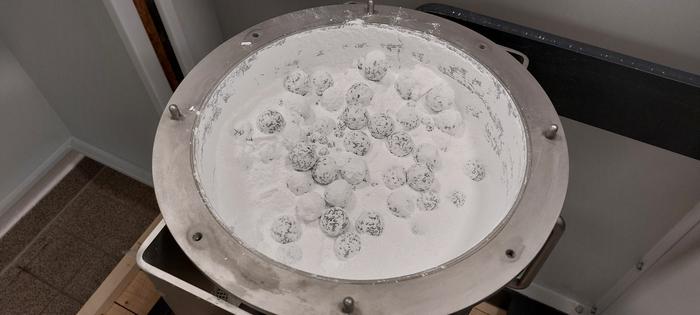
Researchers have making significant strides in pharmaceutical manufacturing through the innovative employment of mechanochemistry, specifically via the utilization of drum mills. This breakthrough has culminated in the large-scale synthesis of ibuprofen-nicotinamide co-crystals, a process that previously faced numerous challenges due to conventional methods. The recent success, part of the European IMPACTIVE project, highlights a greener, more sustainable approach to drug formulation, one that reduces reliance on solvents and minimizes waste.
The importance of ibuprofen cannot be understated; it is among the world’s most widely used pain relievers, recognized for its efficacy by institutions such as the World Health Organization, which has placed it on their list of essential medications. However, traditional challenges such as limited solubility in water, modest bioavailability, and susceptibility to thermal degradation have hindered its therapeutic application. These issues necessitate innovative solutions, and the recent developments from the IMPACTIVE team provide promising avenues for advancement.
Drum milling, a technique that employs a rotating drum filled with metallic balls, has revolutionized the approach to creating pharmaceutical co-crystals. The impact and friction generated by these balls grind the dry compounds, facilitating the desired chemical reactions efficiently. This innovative method not only emphasizes efficiency but also aligns with current industrial practices in sectors like mining and cement production, showcasing its potential for broader application in pharmaceuticals.
The researchers at the Max Planck Institute for Kohlenforschung, under Jan-Hendrik Schöbel’s leadership, are harnessing these drum mills to produce quantities of racemic ibuprofen-nicotinamide co-crystals that reach over three kilograms. This volume marks a pioneering endeavor to utilize green mechanochemistry techniques for large-scale synthesis, transforming how pharmaceutical formulations can be produced sustainably.
One of the study’s key innovations involves combining minimal solvent use—a technique termed liquid-assisted grinding (LAG)—during the milling process. This approach not only augments the efficiency of the grinding process but also enhances the overall yield of the reaction, achieving an astonishing 99% yield after just 90 minutes of milling. Such rapid results underscore the significant advances made possible through mechanochemical techniques.
This new method outperforms traditional solution-based synthesis methods, which typically demand substantial amounts of solvents and have lengthy processing times. Not only does this contribute to environmental sustainability, but it also aligns with regulatory standards concerning solvent use in pharmaceuticals, which often leads to toxic waste generation.
Moreover, mechanochemical synthesis via drum milling shows advantageous outcomes in the quality and stability of the resulting co-crystals. The technique results in notably low levels of metal contamination, typically an issue during milling processes, thereby ensuring compliance with strict regulatory requirements aimed at safeguarding public health.
As drum mills become more prevalent in industrial settings, the implications for pharmaceutical manufacturing are significant. They afford higher scalability and energy efficiency compared to existing methods. According to Schöbel, the industrial drum mills can process much larger volumes of material with less energy expenditure, positioning them as a vital tool for future drug production.
This breakthrough lays the groundwork for the extensive application of mechanochemistry in other pharmaceutical contexts, with many processes ripe for reassessment. Researchers believe that as awareness grows regarding the potential for mechanochemistry to replace traditional methods, an influx of innovation will follow, enabling greener practices across the board in drug manufacturing.
Moreover, this study highlights more than just a novel methodology; it showcases the collaborative effort of numerous partners across Europe, demonstrating the critical role of new research collaborations in fostering advancements in drug formulation and manufacturing practices.
The success of the IMPACTIVE project and the novel approach involving mechanochemistry may prompt a paradigm shift within the pharmaceutical industry, paving the way for subsequent innovations that prioritize not only efficiency and efficacy but also the environmental and economic sustainability essential for future health care solutions.
Through this exploration into mechanochemistry, the project champions the idea that the pharmaceutical industry can evolve. By embracing these innovative techniques, researchers have demonstrated that it’s possible to achieve substantial advancements in drug formulation without the traditional reliance on harmful solvents and resource-intensive processes.
The ongoing research and development in this field inspire a new generation of scientists who may continue to push the boundaries of pharmaceutical innovation, striving towards sustainable practices that labor to ensure the health of both people and the planet. The prospects are indeed exciting as mechanochemistry becomes a focal point of future pharmaceuticals, with the very fabric of the industry poised for significant change.
This pioneering work presents a promising future where the fusion of sustainability and efficiency becomes the norm rather than the exception in pharmaceutical manufacturing. The transformation from conventional methods to energy-efficient and ecologically sound practices is already underway, and we can look forward to a new era in drug synthesis that prioritizes both human health and environmental stewardship.
Subject of Research: Synthesis of ibuprofen-nicotinamide co-crystals using drum mills.
Article Title: Mechanochemical kilogram-scale synthesis of rac-ibuprofen:nicotinamide co-crystals using a drum mill.
News Publication Date: December 3, 2024.
Web References: IMPACTIVE Project.
References: “Mechanochemical kilogram-scale synthesis of rac-ibuprofen:nicotinamide co-crystals using a drum mill,” RSC Mechanochemistry, DOI: 10.1039/D4MR00096J; “Scalability of Pharmaceutical Co-Crystal Formation by Mechanochemistry in Batch,” ChemSusChem, 2024, 17, 6, DOI: 10.1002/cssc.202301220.
Image Credits: Jan-Hendrik Schöbel.
Keywords
Mechanochemistry, Pharmaceutical Manufacturing, Ibuprofen, Co-Crystals, Drum Mills, Green Chemistry.





